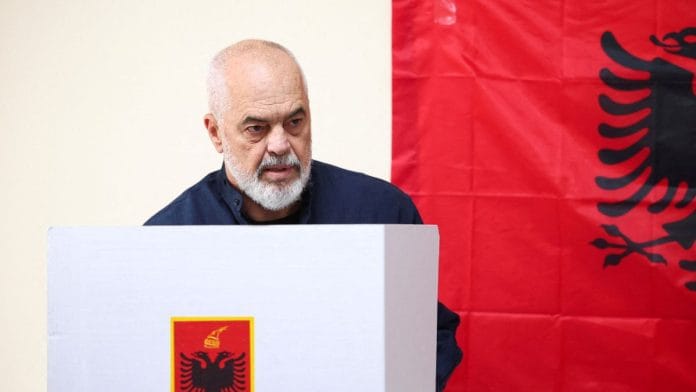New Delhi: Albanian Prime Minister Edi Rama is now the longest-serving leader in the history of the country since the fall of communism, having secured a landmark fourth consecutive term in office Tuesday.
A near-complete count of the ballots domestically and from the diaspora abroad showed that his ruling Socialist Party garnered over 52 percent of the vote in the 11 May elections, winning 83 of the 140 seats in Albanian parliament.
Rama wasted no time in using his renewed mandate to double down on his long-standing ambition—full European Union membership for Albania by 2030. Describing the EU as a “blessing”, Rama told a local media organisation Tuesday that integration with the European bloc is not merely a foreign policy goal, but an existential necessity for Albania’s democratic future.
“I always say, you know, we are blessed to have the EU at the doorstep; otherwise, we could end up like Afghanistan or Iraq or other countries far away that tried to become vibrant democracies, but failed big time because they didn’t have the EU playbook,” he said.
He also called the election victory a fresh chapter for Albania. “It’s going to be a new summer day for Albanians,” he declared, pledging that his government will “not lose a single day” in its mission to meet EU accession benchmarks by the end of the decade.
Looking ahead, Rama has reaffirmed Albania’s commitment to the North Atlantic Treaty Organisation (NATO) and regional peace, while defending controversial agreements, such as the Italy-Albania migrant processing deal, which he described as the result of a “special relationship” with Rome.
From India, Dikshu C. Kukreja, Honorary Consul General of Albania, welcomed the result, calling Rama’s fourth term a “promising horizon” for Albania’s regional and global partnerships. “As vibrant democracies, Albania and India share deep-rooted values. The coming years offer immense potential to strengthen our ties across education, tourism, trade, and innovation,” he told ThePrint.
Albania has undergone significant transformation over the past decade under Rama’s leadership—from digital governance reforms and infrastructure overhauls, to tourism development and growing diplomatic presence on the world stage. However, his tenure has also drawn criticism over democratic backsliding, allegations of corruption, and what critics describe as excessive control over public institutions.
International election observers, including missions from the Organisation for Security and Co-operation in Europe (OSCE), Parliamentary Assembly of the Council of Europe (PACE), and the European Parliament, praised the professionalism of the electoral process, but raised serious concerns—misuse of public funds, voter intimidation, and a campaign climate marred by personal attacks, rather than substantive debate.
“Our long-term observers witnessed widespread intimidation and abuse of public resources,” Lamberto Zannier, head of the OSCE mission, told local media.
Among the most prominent controversies of Rama’s third term was the recent arrest of Tirana’s Mayor, Erion Veliaj—a close ally—on charges of corruption and money laundering. Both Veliaj and Rama have denied the allegations. Voices from the Opposition have also accused Rama of centralising power and stifling dissent, raising alarm about the erosion of democratic checks and balances.
Rama’s main rival, former president and prime minister Sali Berisha, led the conservative Democratic Party to nearly 34 percent of the vote. Though his party maintained strong support in three northern provinces, Berisha, who is barred from entering the US and UK over corruption allegations, was unable to break Rama’s nationwide grip. His campaign leaned heavily on populist rhetoric, including the slogan “Make Albania Great Again”.
(Edited by Mannat Chugh)






